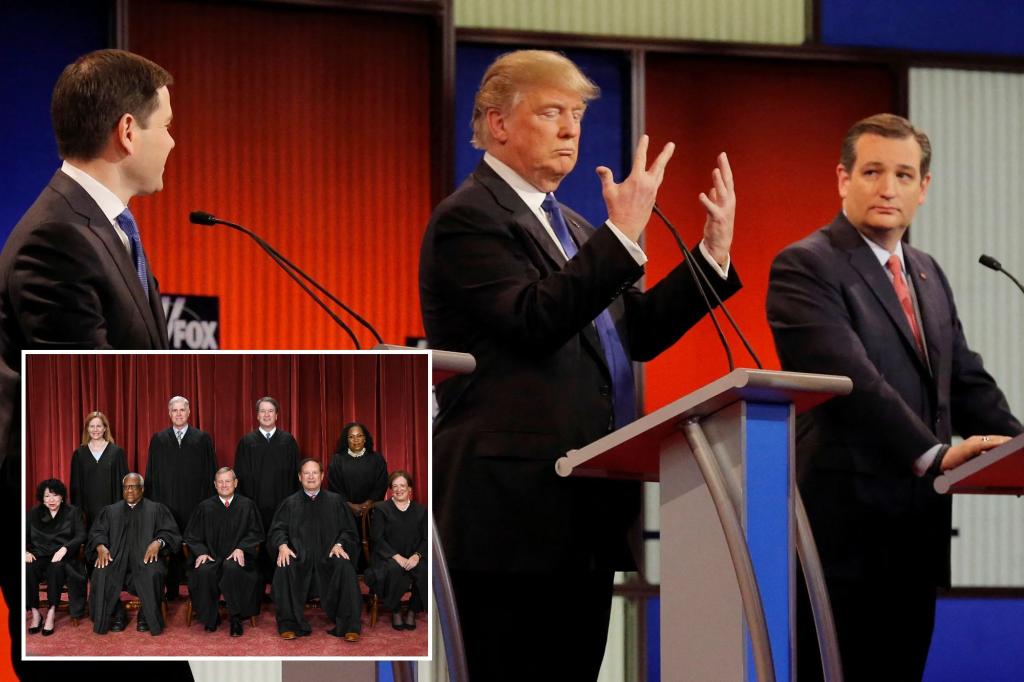A Supreme Court justice appeared highly skeptical Wednesday of a California lawyer’s effort to trademark the phrase “Trump is too small.”
Attorney Steve Elster has appealed the Patent and Trademark Office’s rejection of his trademark application for use of the phrase on a t-shirt, claiming the government violated his First Amendment rights by doing so.
The slogan is a nod to a riff by Sen. Marco Rubio (R-Fla.) during his 2016 presidential campaign that mocked the size of Donald Trump’s hands.
“He’s taller than me, he’s like 6′ 2″, that’s why I don’t understand why his hands are the size of a 5′ 2 person,” Rubio told supporters in a stump speech. “Did you see his hand? And you know what they say about men with small hands — you can’t trust them.”
At a subsequent debate, Trump – who had sparked Rubio’s remarks by calling him “Little Marco” – quipped: “He was referring to my hand, [suggesting] if they are small, something else must be small.
Donald Trump insists his hand is not small during the 2016 GOP debate. REUTERS
“I guarantee you will have no problem,” added the future 45th president. “I guarantee.”
Elster had been trying to trademark the slogan since 2018 to disparage Trump’s policies, but the trademark office rejected it on the grounds that he was using Trump’s name without his consent.
“At the end of the day, it’s pretty hard to argue that a tradition that’s been around for a long time — since the founding, common law type of thing — is inconsistent with the First Amendment,” Justice Neil Gorsuch said during oral arguments Wednesday.
Most of the judges on the Supreme Court seem very skeptical about the trademark case. AFP via Getty Images
“[A] A trademark is a monopoly, is what it is. It is a government granted patent, the old patent monopoly. And some things you are not allowed to monopolize,” he added.
Before the case reached the Supreme Court, Elster appealed the preliminary ruling to the Trademark Trial and Appeal Board, which upheld the rejection.
Later, Elster took the case to the DC US Court of Appeals for the Federal Circuit, which concluded that the law supporting the refusal was unconstitutional.
The Biden administration took the decision to the high court.
The Supreme Court could eventually be dragged into cases revolving around Donald Trump’s various legal problems.EPA
Justice Sonia Sotomayor investigated Elster’s argument that his free speech rights had been undermined.
“The question is, is this a violation of speech? And the answer is no,” he said. “He can sell as many shirts with this saying, and the government doesn’t tell him he can’t use the phrase, he can sell it anywhere he wants. There is no limit for him to sell it. So there is no traditional violation.”
Chief Justice John Roberts pondered whether granting Elster a trademark could impede the right of others to engage in political expression.
“That really cuts out a lot of expression that other people might consider a significant violation of their First Amendment rights,” he argued.
Donald Trump has appointed one-third of the Supreme Court.AFP via Getty Images
Elster’s lawyer Jonathan Taylor admitted that his client could still sell t-shirts with the phrase despite losing the trademark application. He is currently selling them for about $29.99 each.
In the legal brief, Elster’s team highlights how positive messages like “Hillary for America” can win approval while more negative phrases like “Hillary for Prison 2016” are often rejected.
“While celebrity fan bases can register their celebrity adoration names as trademarks (eg, SWIFTIES, ARNIE’S ARMY, and BEYHIVE), groups opposing presidential candidates have had their requests denied under the clause (eg, ‘Never Trumper’),” they said. . “That is contrary to the mandate of the First Amendment.”
The Biden administration counters that current trademark law amounts to a “reasonable, interest-neutral point of view.”
SCOTUS Judge Amy Coney Barrett posed a hypothesis during oral arguments in the “Trump Too Small” case:
“Let’s imagine…someone wants to write a book titled ‘Trump Too Small’ detailing Trump’s pettiness over the years and simply arguing that he is not a suitable public official…” pic.twitter.com/RYIrzN52lm
— The Recount (@therecount) November 1, 2023
“Even if Mr. Elster couldn’t register the sign ‘Trump is too small,’ he could sell shirts with that slogan,” said Deputy Solicitor General Malcolm Stewart, in his 100th appearance before the high court.
Judge Amy Coney Barrett, one of the three Trump candidates who heard the case, experienced a hypothesis where, “someone wants to write a book called ‘Trump Too Small’ detailing Trump’s pettiness over the years and simply arguing that he is not a suitable public figure. official.”
“Are you saying it would be like a basic, rational standard for analyzing whether that copyright restriction is justified?” he asked.
“I’m not ready to say what the answer is, but I’m ready to say that there’s nothing that necessarily follows our position in this case with respect to that hypothetical law,” Taylor said.
The Supreme Court is expected to make a decision on the matter by early July next year at the latest.
Categories: Trending
Source: thtrangdai.edu.vn/en/



